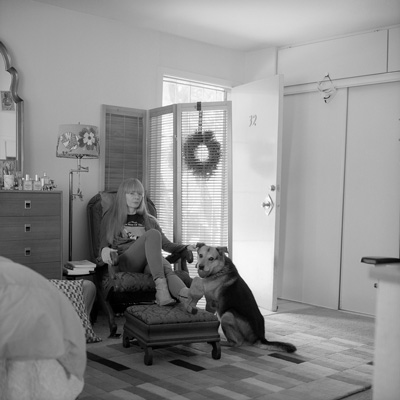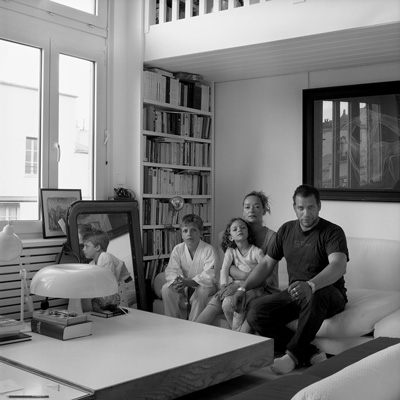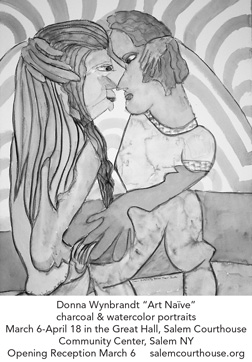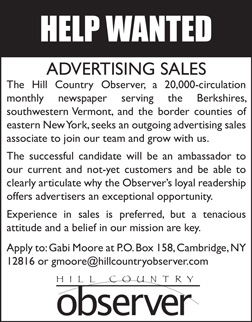Arts and Culture February-March 2015
Fast friends
Photographer seeks out the reality behind Facebook’s virtual world
 By JOHN SEVEN
By JOHN SEVEN
Contributing writer
NORTH ADAMS, Mass.
Shannon Rose Riley and Joey Ramone the dog of San Jose, Calif., are among the subjects of more than 600 portraits by the photographer Tanya Hollander, who set out to meet and photograph all of her Facebook friends. The work will be exhibited at Mass MoCA beginning in March 2017. courtesy of Tanya Hollander
The photographer Tanya Hollander spent New Year’s Eve 2010 ruminating about the nature of friendship in the digital age.
Are Facebook friends really your friends? Does the way we communicate with friends -- texting, instant messaging, by phone or Skype, or just seeing them in person -- make a friendship mean any more or less?
To help answer these questions, Hollander embarked on a still-ongoing project in which she has traveled to more than 40 states and five countries to personally meet and photograph all of the 626 people she counted as Facebook friends at the beginning of 2011.
Her formal portraits, which recall the work of 20th century documentary photographers like Dorothea Lange and Walker Evans, give a glimpse into her subjects’ lives through the details of their surroundings.
After two years in which she’s spent an average of two weeks every month on the road, Hollander now has a deadline to finish her project: She recently reached an agreement to exhibit the work at the Massachusetts Museum of Contemporary Art. The show -- titled “Are You Really My Friend?” -- is being assembled under the curatorial guidance of Denise Markonish and is scheduled to debut in March 2017.
Hollander, who lives in Auburn, Maine, has already shown early, partial versions of the project in various places. But the show at Mass MoCA will feature the complete set of portraits as well as videos and other elements from her travels.
Hollander said the partnership with Mass MoCA has energized her and ensured that the work will be completed. It also fulfills her dream for the project’s culmination.
“In 2013, I started driving across the country to photograph,” Hollander said. “When I would stop, I would try to set up lectures at schools to help fund it. I often get asked questions like, ‘How do you see this finishing?’ or ‘When you get done, what are you going to do?’
“I was constantly saying that I want to have a show at Mass MoCA, because it’s my favorite museum in the country, and the space is big enough to show the entire body of work, and it has such a nice feeling to it. It doesn’t feel institutional in the way most museums do.
“I was saying this over and over and over again. Then I was driving back to the East Coast, and I thought, ‘I should just tell Mass MoCA that.’ I had been telling everyone else but them.”
Hollander finally did tell them -- or specifically Markonish, who had worked with Hollander on a group show years ago. Hollander arranged to meet with her on one of her journeys back to Maine. Two months later, the museum told her they were ready to work with her.
“It was one of those weird serendipity things,” Hollander said. “Shows don’t usually happen that easily.”
Stories behind a virtual community
After her New Year’s Eve inspiration at the end of 2010, Hollander spent the early part of 2011 researching and building a spreadsheet of her Facebook friends. She compiled such details as where they lived, and she created a profile of each friend. The final step was to send out a mass e-mail telling all of her friends about the project.
“I started with the people who responded and seemed excited about the work,” Hollander said.
On each visit, she took a photographic portrait – using a film camera -- of her Facebook friend and their family: their spouse or partner, children or pets.
“I really wanted a sense of place,” Hollander said. “Place, like the things that people surround themselves with, because I think that tells so much about the person. When I started, I was interested in how we create community and how we create home, and community being anything from the people we surround ourselves with to the things to the places in which we live – neighborhoods, the contemporary culture aspect of it.”
 Some of her Facebook friends are relatives or people she’s known well for most of her life. Others are people she had never met in person before this project.
Some of her Facebook friends are relatives or people she’s known well for most of her life. Others are people she had never met in person before this project.
“I think for me it’s about exploring how we’re all living and creating lives, and I’m really curious about that,” Hollander said. “I love going to the middle of nowhere and seeing somebody doing this really cool thing, or in this fantastic house.”
Hollander said the project has evolved since her initial thoughts about it, always pushed further ahead by the visits to her friends. Each stop, she said, brings new knowledge and adds to the overall work and its conclusions.
“In the beginning, I was really interested in how we communicate now, and how that’s changed our relationships and definitions of friendship,” she said. “The handwritten letter that I was writing versus the instant message: Was one more real than the other?”
One initial goal was to consider “texting versus phone call, e-mail versus texting -- all of the different ways we communicate with technology, and how that’s affecting our relationships.”
As she has visited and photographed the friends, her concept of the work began to change.
“I think what I’ve learned is that there are so many different kinds of friendships,” Hollander said. “It’s not like sixth grade, where your best friend is the friend you go to school with, go to the movies with, stay up all night with. When you’re an adult, you have friends that you have dinner with, other friends that you go to the museum with, other friends that you see music with. It’s not all one person anymore.”
Connecting the details
There have been unexpected discoveries. For instance, Hollander said she has noticed that friends she is meeting in person for the first time – those she had previously only known through social media -- tend to be much more accommodating than those she has known personally for a long time, a circumstance that surprises her.
She’s also found that wives or girlfriends of her male Facebook friends are more likely to not want to be part of the project than the husbands or boyfriends of her female Facebook friends.
And scheduling always goes better with a woman.
“Scheduling takes up more time than anything else in this project,” Hollander said. “Usually if I can get in touch with the female of the household, the wife or whatever, it’s usually one or two e-mails back and forth, and it’s done. But if it’s the husband, it’s a long, drawn-out process.”
Hollander said the greatest thing she’s learned in the project so far is how much life each Facebook friend has behind them -- a whole back story filled with details that can’t be gleaned from a Facebook feed. Her visits, she said, have elevated and energized the part of her that savors such discovery.
“I’ve always been curious about stuff,” Hollander said. “Through this, and doing it on such a focused and extreme level, I’ve learned about so many different things, all over the place. Now my curiosity is 10 times what it was before.”
Hollander’s plan is to finish the photography for the show this year and spend the first half of 2016 designing the book that will accompany the show. The latter half of next year will be consumed by production, printing, building Web sites, and doing whatever else the show will require. After that will come the nuts and bolts of putting together the show.
But what about Facebook friends? If Hollander gains any new ones, does that mean more work for the show?
“I made a cutoff when I made my first spreadsheet,” she said. “But if I’m at your house anyway, I’ll probably do your portrait. I’ve made new friends that are now close friends since that time. If I’m with my camera, I will photograph them. But I want this to end. As much fun as I’m having, I want this to end.”
For more information about Tanja Hollander, visit www.tanjaalexiahollander.com. More details about her Facebook project are at www.facebookportraitproject.com.


